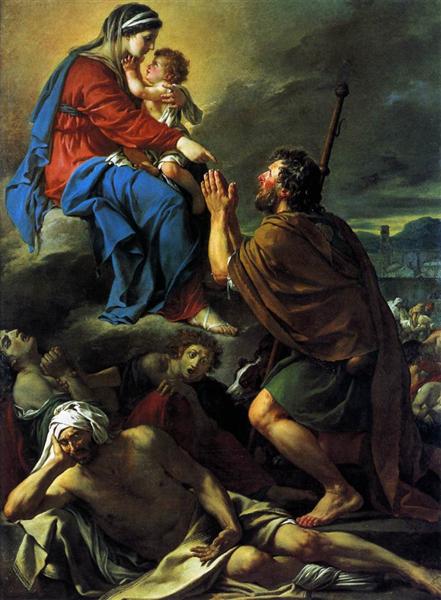Description
Jacques-Louis David, one of the most prominent exponents of neoclassicism, offers us in "Saint Roch Praying to the Virgin for the End of the Plague" (1780) a work that combines technical mastery and a powerful symbolic charge. This painting not only shows us a moment of religious fervour, but at the same time captures the pain and despair of a society ravaged by the plague, a theme of great relevance in the 18th century.
The composition of the work presents Saint Roch, a saint much venerated in Europe for his intercession in times of epidemics, in the centre of the scene. His figure is shown in a moment of intimate prayer, with his hands raised and his eyes directed towards heaven. The representation of Saint Roch is notable for its simplicity and sincerity, with the habit of a pilgrim who carries with him the burden of suffering on his back. This image of the saint, who is traditionally represented with a dog at his side, echoes his life story, where, after being affected by the plague, he dedicated his existence to helping the sick.
David employs a sophisticated use of color, contrasting warm and cool tones that bring depth and drama to the scene. The reds of St. Roch's clothing, in conjunction with the blues of the background, create a rich chromatic dialogue that draws the viewer's attention to the saint, but also to the figure of the Virgin who appears in the foreground, symbolizing hope and divinity. The Virgin, although not the main focus of the work, is positioned as a symbol of comfort, elevating the dramatization of St. Roch's plea. Her representation is ethereal, enveloped in a luminosity that contrasts with the earthly burden of the saint's figure.
The choice of subject matter is also considerable. Plague was a constant concern in Europe at the time, and David, through this painting, invites reflection on the fragility of life and the need to turn to faith in times of crisis. The fact that the work was created in a context in which disease was raging resonates with the 18th-century viewer in a very close way, showing the ability of art to reflect and, at the same time, offer catharsis in dark times.
David's neoclassical style is manifest not only in the attention to detail and homage to classical traditions, but also in the clarity of visual narrative. David distances himself from the exuberance of the Rococo, opting instead for a more restrained and monumental approach that seeks grandeur in simplicity and morality of the image. This approach can also be seen in other works from his career, such as The Oath of the Horatii or The Death of Socrates, where a strong dialogue is established between history and morality.
It is important to note that although “Saint Roch Praying to the Virgin” is not as well known as his more iconic works, this painting stands as a testament to David’s deep engagement with the themes of his time and his quest to shape a visual narrative that was both thoughtful and moving. Thus, through this work, he reaffirms not only his mastery as a painter, but also his ability to connect with the soul of the viewer in a moment of urgency and deep spiritual need.
KUADROS ©, a famous painting on your wall.
Hand-made oil painting reproductions, with the quality of professional artists and the distinctive seal of KUADROS ©.
Painting reproduction service with satisfaction guarantee. If you are not completely satisfied with the replica of your painting, we will refund 100% of your money.

